乔布斯平生英文简介
介绍乔布斯的英语作文
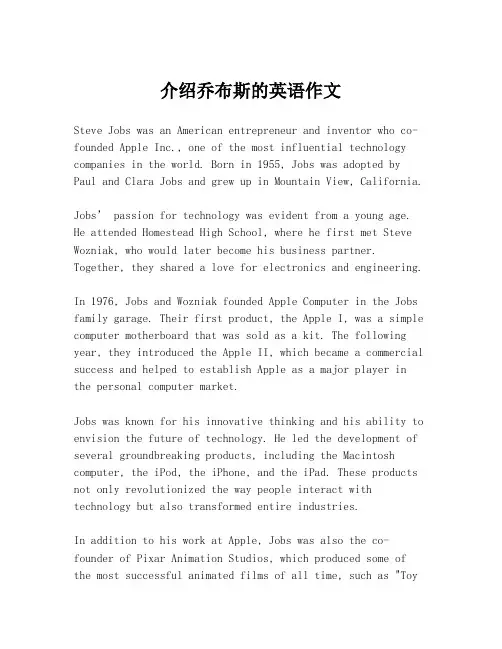
介绍乔布斯的英语作文Steve Jobs was an American entrepreneur and inventor who co-founded Apple Inc., one of the most influential technology companies in the world. Born in 1955, Jobs was adopted by Paul and Clara Jobs and grew up in Mountain View, California.Jobs’ passion for technology was evident from a young age. He attended Homestead High School, where he first met Steve Wozniak, who would later become his business partner. Together, they shared a love for electronics and engineering.In 1976, Jobs and Wozniak founded Apple Computer in the Jobs family garage. Their first product, the Apple I, was a simple computer motherboard that was sold as a kit. The following year, they introduced the Apple II, which became a commercial success and helped to establish Apple as a major player in the personal computer market.Jobs was known for his innovative thinking and his ability to envision the future of technology. He led the development of several groundbreaking products, including the Macintosh computer, the iPod, the iPhone, and the iPad. These products not only revolutionized the way people interact with technology but also transformed entire industries.In addition to his work at Apple, Jobs was also the co-founder of Pixar Animation Studios, which produced some of the most successful animated films of all time, such as "ToyStory" and "Finding Nemo."Jobs was not just a brilliant inventor and entrepreneur; he was also a charismatic leader and a visionary. His famous "Think Different" campaign inspired people to challenge the status quo and to pursue their dreams.However, Jobs faced his share of challenges. He was forced out of Apple in 1985, only to return in 1997 and lead the company to even greater heights. Despite battling pancreatic cancer, Jobs continued to work and innovate until his untimely death in 2011.Steve Jobs left an indelible mark on the world. His legacy is not just the products he created but also the culture of innovation and excellence that he fostered at Apple. He is remembered as a pioneer who changed the way we live, work, and communicate, and whose vision continues to inspire future generations.。
史蒂芬乔布斯一生英语作文
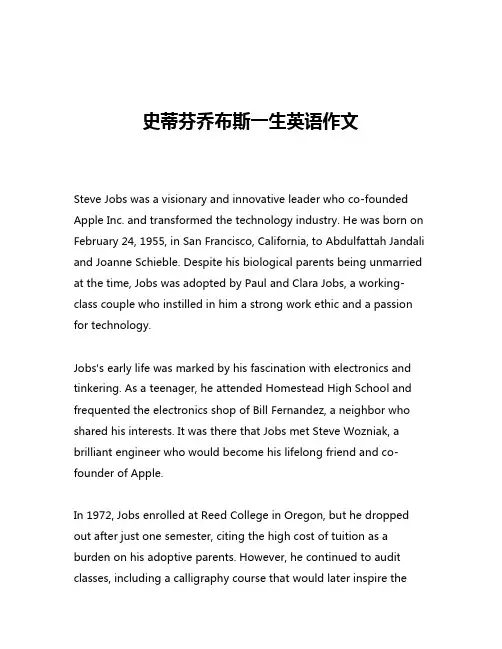
史蒂芬乔布斯一生英语作文Steve Jobs was a visionary and innovative leader who co-founded Apple Inc. and transformed the technology industry. He was born on February 24, 1955, in San Francisco, California, to Abdulfattah Jandali and Joanne Schieble. Despite his biological parents being unmarried at the time, Jobs was adopted by Paul and Clara Jobs, a working-class couple who instilled in him a strong work ethic and a passion for technology.Jobs's early life was marked by his fascination with electronics and tinkering. As a teenager, he attended Homestead High School and frequented the electronics shop of Bill Fernandez, a neighbor who shared his interests. It was there that Jobs met Steve Wozniak, a brilliant engineer who would become his lifelong friend and co-founder of Apple.In 1972, Jobs enrolled at Reed College in Oregon, but he dropped out after just one semester, citing the high cost of tuition as a burden on his adoptive parents. However, he continued to audit classes, including a calligraphy course that would later inspire theelegant typography of Apple's products.After leaving Reed College, Jobs worked a series of odd jobs, including as a technician at Atari, a video game company. It was during this time that he and Wozniak began collaborating on their first computer project, the Apple I, which they built in Jobs's parents' garage. The success of the Apple I led them to co-found Apple Computer in 1976, with Jobs serving as the company's visionary and Wozniak as the technical genius.The early years of Apple were marked by rapid growth and innovation. Jobs and Wozniak introduced the Apple II, the first personal computer to gain widespread popularity, and the Macintosh, which revolutionized the personal computing industry with its user-friendly graphical interface. Jobs's attention to detail and insistence on quality design became hallmarks of Apple's products, setting the company apart from its competitors.However, Jobs's tenure at Apple was not without its challenges. In 1985, he was ousted from the company he had co-founded, following a power struggle with the board of directors. This setback did not deter him, and he went on to found NeXT, a computer company that focused on the education and business markets.During his time at NeXT, Jobs also acquired Pixar, an animationstudio that had previously produced the groundbreaking film "Toy Story." Under his leadership, Pixar became a powerhouse in the animation industry, producing a string of critically acclaimed and commercially successful films, including "A Bug's Life," "Monsters, Inc.," and "Finding Nemo."In 1996, Apple acquired NeXT, and Jobs returned to the company he had co-founded. This move proved to be a turning point in Apple's history, as Jobs brought his vision and expertise to revitalize the struggling tech giant. He introduced a series of innovative products, including the iMac, the iPod, the iPhone, and the iPad, which transformed the way people interacted with technology.Jobs's attention to detail and insistence on quality design were instrumental in Apple's resurgence. He was known for his demanding and sometimes abrasive management style, but his passion for creating products that delighted customers was unparalleled. Under his leadership, Apple became one of the most valuable and influential companies in the world, with a devoted customer base and a reputation for innovation.However, Jobs's personal life was not without its challenges. In 2003, he was diagnosed with pancreatic cancer, a diagnosis that he initially kept private. Despite undergoing surgery and treatment, the cancer eventually spread, and Jobs stepped down as Apple's CEO in 2011,handing the reins to Tim Cook.In his final years, Jobs continued to work on new projects and ideas, including the design of Apple's new headquarters in Cupertino, California. He passed away on October 5, 2011, at the age of 56, leaving behind a legacy as one of the most influential and innovative leaders in the technology industry.Jobs's impact on the world cannot be overstated. He revolutionized the personal computer, the music industry, and the smartphone market, and his vision for Apple's products and user experience has influenced countless other companies and industries. His relentless pursuit of perfection and his unwavering commitment to creating products that enrich people's lives have left an indelible mark on the technology landscape.。
StevenPaul乔布斯生平(中英文对照)
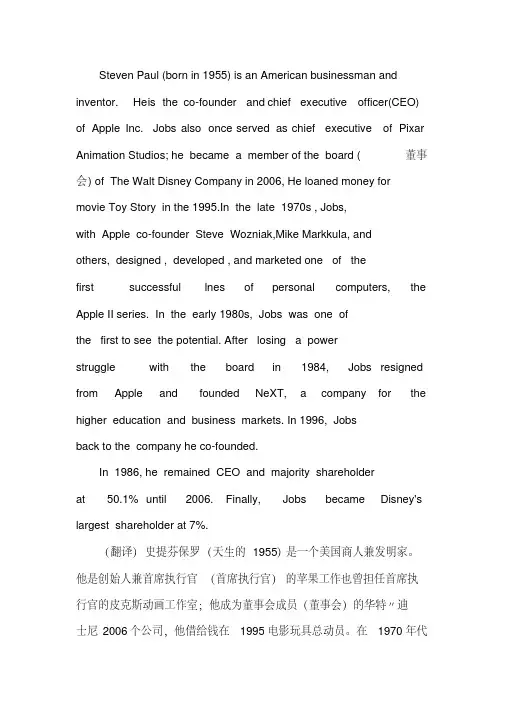
Steven Paul (born in 1955) is an American businessman and inventor. He i s the co-founder and chief executive officer(CEO) of Apple Inc. Jobs also once served as chief executive of Pixar Animation Studios; he became a member of the board (董事会) of The Walt Disney Company in 2006, He loaned money formovie Toy Story in the 1995.In the late 1970s , Jobs,with Apple co-founder Steve Wozniak,Mike Markkula, andothers, designed , developed , and marketed one of thefirst successful lnes of personal computers, the Apple II series. In the early 1980s, Jobs was one ofthe first to see the potential. After losing a powerstruggle with the board in 1984, Jobs resigned from Apple and founded NeXT, a company for the higher education and business markets. In 1996, Jobsback to the company he co-founded.In 1986, he remained CEO and majority shareholderat 50.1% until 2006. Finally, Jobs became Disney's largest shareholder at 7%.(翻译)史提芬保罗(天生的1955)是一个美国商人兼发明家。
乔布斯英文介绍!!超经典!!
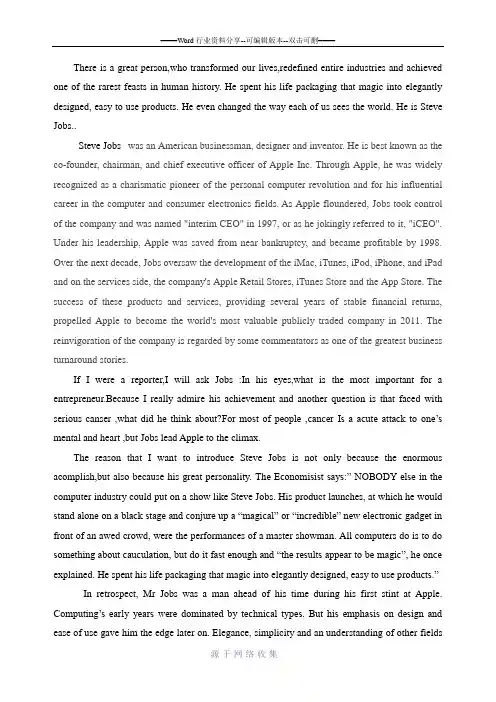
There is a great person,who transformed our lives,redefined entire industries and achieved one of the rarest feasts in human history. He spent his life packaging that magic into elegantly designed, easy to use products. He even changed the way each of us sees the world. He is Steve Jobs..Steve Jobs was an American businessman, designer and inventor. He is best known as the co-founder, chairman, and chief executive officer of Apple Inc. Through Apple, he was widely recognized as a charismatic pioneer of the personal computer revolution and for his influential career in the computer and consumer electronics fields.As Apple floundered, Jobs took control of the company and was named "interim CEO" in 1997, or as he jokingly referred to it, "iCEO". Under his leadership, Apple was saved from near bankruptcy, and became profitable by 1998. Over the next decade, Jobs oversaw the development of the iMac, iTunes, iPod, iPhone, and iPad and on the services side, the company's Apple Retail Stores, iTunes Store and the App Store. The success of these products and services, providing several years of stable financial returns, propelled Apple to become the world's most valuable publicly traded company in 2011. The reinvigoration of the company is regarded by some commentators as one of the greatest business turnaround stories.If I were a reporter,I will ask Jobs :In his eyes,what is the most important for a entrepreneur.Because I really admire his achievement and another question is that faced with serious canser ,what di d he think about?For most of people ,cancer Is a acute attack to one’s mental and heart ,but Jobs lead Apple to the climax.The reason that I want to introduce Steve Jobs is not only because the enormous acomplish,but also because his great personality. Th e Economisist says:” NOBODY else in the computer industry could put on a show like Steve Jobs. His product launches, at which he would stand alone on a black stage and conjure up a “magical” or “incredible” new electronic gadget in front of an awed crowd, were the performances of a master showman. All computers do is to do something about cauculation, but do it fast enough and “the results appear to be magic”, he once explained. He spent his life packaging that magic into elegantly designed, easy to use pro ducts.”In retrospect, Mr Jobs was a man ahead of his time during his first stint at Apple. Computing’s early years were dominated by technical types. But his emphasis on design and ease of use gave him the edge later on. Elegance, simplicity and an understanding of other fieldscame to matter in a world in which computers are fashion items, carried by everyone, that can do almost anything. “Technology alone is not enough,” said Mr Jobs at the end of his speech introducing the iPad, in January 2010. “It’s technolo gy married with liberal arts, married with humanities, that yields the results that make our hearts sing.” It was an unusual statement for the head of a technology firm, but it was vintage Steve Jobs.He attributed his success to an obsessive attention to detail , his pursuit of perfection and his flair for innovation.He said- "I want to make icons do look lick with his tongue"; To be able to sleep at night, to the aesthetic and quality throughout the pursuit of excellence""Do not let the noise of others opinions drown your inner voice, heart and intuition to have the courage to listen to the call." - He is Apple's "The Godfather" Jobs. "A pirate, a paranoid, a perfect combination of art and technology of IT leaders, a person who changed the world." He said in his youth that he wanted to “put a ding in the universe” did just that.到目前为止,世界上还没有哪个计算机行业或者其他任何行业的领袖能够像乔布斯那样举办出一场万众瞩目的盛会。
史蒂芬乔布斯的英文介绍
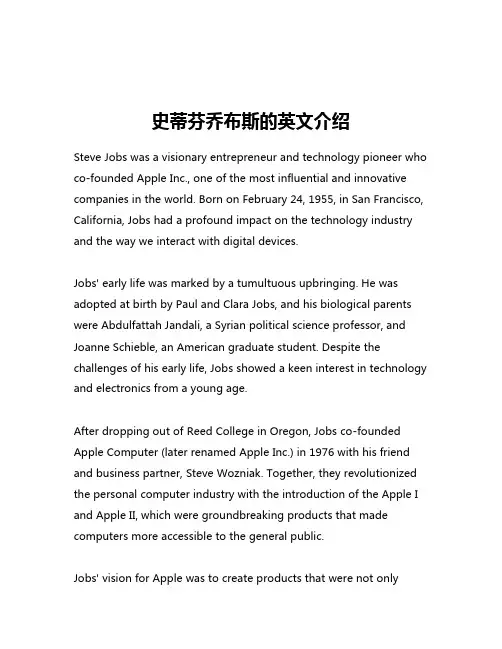
史蒂芬乔布斯的英文介绍Steve Jobs was a visionary entrepreneur and technology pioneer who co-founded Apple Inc., one of the most influential and innovative companies in the world. Born on February 24, 1955, in San Francisco, California, Jobs had a profound impact on the technology industry and the way we interact with digital devices.Jobs' early life was marked by a tumultuous upbringing. He was adopted at birth by Paul and Clara Jobs, and his biological parents were Abdulfattah Jandali, a Syrian political science professor, and Joanne Schieble, an American graduate student. Despite the challenges of his early life, Jobs showed a keen interest in technology and electronics from a young age.After dropping out of Reed College in Oregon, Jobs co-founded Apple Computer (later renamed Apple Inc.) in 1976 with his friend and business partner, Steve Wozniak. Together, they revolutionized the personal computer industry with the introduction of the Apple I and Apple II, which were groundbreaking products that made computers more accessible to the general public.Jobs' vision for Apple was to create products that were not onlytechnologically advanced but also beautifully designed and user-friendly. He believed that technology should be seamlessly integrated into people's lives, making it easier and more enjoyable to interact with digital devices. This philosophy was evident in the design and development of Apple's iconic products, including the Macintosh, the iMac, the iPod, the iPhone, and the iPad.One of Jobs' most significant achievements was the development of the iPhone, which was released in 2007. The iPhone revolutionized the smartphone industry and changed the way people interacted with their mobile devices. With its sleek design, intuitive touch-screen interface, and powerful features, the iPhone quickly became a global phenomenon, and it remains one of the most popular and influential products in the technology industry.In addition to his work at Apple, Jobs was also involved in other technology-related ventures, including the founding of Pixar Animation Studios, which produced some of the most beloved animated films of all time, such as Toy Story, Finding Nemo, and The Incredibles. Jobs' leadership and creative vision were instrumental in Pixar's success, and he played a key role in shaping the company's artistic and technological direction.Despite his many successes, Jobs' life was not without its challenges. In 2003, he was diagnosed with a rare form of pancreatic cancer,which he fought with characteristic determination and resilience. Although he took a leave of absence from Apple to undergo treatment, he ultimately returned to the company and continued to lead it to new heights.Jobs' legacy extends far beyond his achievements in the technology industry. He was also a passionate advocate for design, education, and environmental sustainability, and he used his platform to promote these causes. He was known for his charismatic and inspiring public speaking, and his keynote addresses at Apple events were eagerly anticipated by tech enthusiasts and the general public alike.Sadly, Jobs passed away on October 5, 2011, at the age of 56, after a long battle with cancer. His death was a profound loss for the technology community and the world at large, but his legacy continues to inspire and influence people around the globe.In the years since his passing, Jobs' impact on the technology industry and the world has only grown. Apple has continued to innovate and push the boundaries of what is possible with digital devices, and Jobs' vision and principles remain at the core of the company's identity. Moreover, his influence can be seen in the work of countless entrepreneurs, designers, and innovators who have been inspired by his relentless pursuit of perfection and hisunwavering commitment to creating products that enhance and enrich people's lives.In conclusion, Steve Jobs was a true visionary and a transformative figure in the technology industry. His passion, creativity, and dedication to excellence have left an indelible mark on the world, and his legacy will continue to inspire and shape the future of technology for generations to come.。
stevejobs生平简介英文翻译
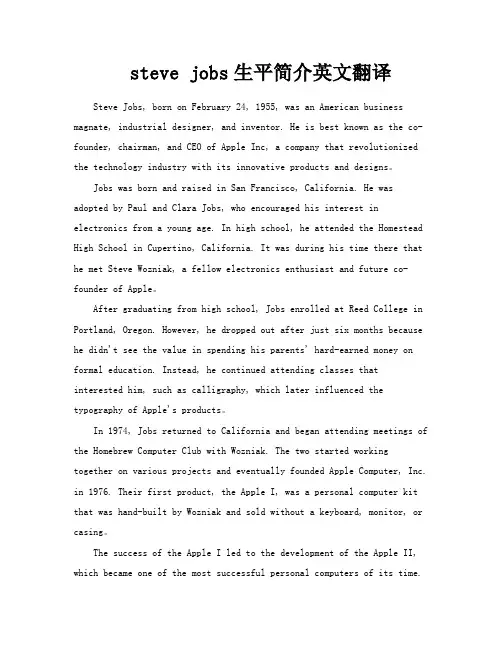
steve jobs生平简介英文翻译Steve Jobs, born on February 24, 1955, was an American business magnate, industrial designer, and inventor. He is best known as the co-founder, chairman, and CEO of Apple Inc, a company that revolutionized the technology industry with its innovative products and designs。
Jobs was born and raised in San Francisco, California. He was adopted by Paul and Clara Jobs, who encouraged his interest in electronics from a young age. In high school, he attended the Homestead High School in Cupertino, California. It was during his time there that he met Steve Wozniak, a fellow electronics enthusiast and future co-founder of Apple。
After graduating from high school, Jobs enrolled at Reed College in Portland, Oregon. However, he dropped out after just six months because he didn't see the value in spending his parents' hard-earned money on formal education. Instead, he continued attending classes thatinterested him, such as calligraphy, which later influenced the typography of Apple's products。
Steve-Jobs(乔布斯英文介绍)
Enlightenment
Dream & Perseverance
Thank you !
1985: National medal of technology 1987: Jefferson Award for public service 2007: The most powerful person in business by Fortune Magazine 2009: CEO of the decade by Fortune Magazine 2010: person of the year for 2010 by Financial Times
1955--2011
--Made by Cathy
contents Resume
Achievements
Honor
Quotes
Evaluations
Resume
1955 Born in San Francisco, California, US
1972 Enrolled at Reed College, dropped out of college after six months
Achievement
Jobs has led iMac, iPod, iPad, iPhone and many other well-known digital products.
Apple II
New iMac computer
iPod MacBook Air iPhone iPad
Honors
1976 Teamed up with a friend to build the world‘s first Apple computer
乔布斯英文介绍!!超经典!!
乔布斯英文介绍!!超经典!!第一篇:乔布斯英文介绍!!超经典!!There is a great person,who transformed our lives,redefined entire industries and achieved one of the rarest feasts in human history.He spent his life packaging that magic into elegantly designed, easy to use products.He even changed the way each of us sees the world.He is Steve Jobs.Everyone maybe is familiar with him,especially with his products--iphone.itouch.ipad.Steve Jobswas an American businessman, designer and inventor.He is best known as the co-founder, chairman, and chief executive officer of Apple Inc.Through Apple, he was widely recognized as a charismatic pioneer of the personal computer revolution and for his influential career in the computer and consumer electronics fields.As Apple floundered, Jobs took control of the company and was named “interim CEO” in 1997, or as he jokingly referred to it, “iCEO”.Under his leadership, Apple was saved from near bankruptcy, and became profitable by 1998.Over the next decade, Jobs oversaw the development of the iMac, iTunes, iPod, iPhone, and iPad and on the services side, the company's Apple Retail Stores, iTunes Store and the App Store.The success of these products and services, providing several years of stable financial returns, propelled Apple to become the world's most valuable publicly traded company in 2011.The reinvigoration of the company is regarded by some commentators as one of the greatest business turnaround stories.If I were a reporter,I will ask Jobs :In his eyes,what is the most important for a entrepreneur.Because I really admire his achievement and another question is that faced with serious canser ,what did he think about?For most of people ,cancer Is aacute attack to one’s mental and heart ,but Jobs lead Apple to the climax.The reason that I want to introduce Steve Jobs is not only because the enormous acomplish,but also because his great personality.The Economisist says:” NOBODY else in the computer industry could put on a show like Steve Jobs.His product launches, at which he would stand alone on a black stage and conjure up a “magical” or “incredible” new electronic gadget in front of an awed crowd, were the performances of a master showman.All computers do is to do something about c auculation, but do it fast enough and “the results appear to be magic”, he once explained.He spent his life packaging that magic into elegantly designed, easy to useproducts.”In retrospect, Mr Jobs was a man ahead of his time during his first stint at Ap puting’s early years were dominated by technical types.But his emphasis on design and ease of use gave him the edge later on.Elegance, simplicity and an understanding of other fields came to matter in a world in which computers are fashion items, carried by everyone, that can do almost anything.“Technology alone is not enough,” said Mr Jobs at the end of his speech introducing the iPad, in January 2010.“It’s technology married with liberal arts, married with humanities, that yields the results that m ake our hearts sing.” It was an unusual statement for the head of a technology firm, but it was vintage Steve Jobs.He attributed his success to an obsessive attention to detail , his pursuit of perfection and his flair for innovation.He said-“I want to mak e icons do look lick with his tongue”;To be able to sleep at night, to the aesthetic and quality throughout the pursuit of excellence“"Do not let the noise of others opinions drown your inner voice, heart andintuition to have the courage to listen to the call.”-He is Apple's “The Godfather” Jobs.“A pirate, a paranoid, a perfect combination of art and technology of IT leaders, a person who changed the world.” He said in his youth that he wanted to “put a ding in the universe” did just that.到目前为止,世界上还没有哪个计算机行业或者其他任何行业的领袖能够像乔布斯那样举办出一场万众瞩目的盛会。
史蒂夫乔布斯的英语简介英文介绍
史蒂夫乔布斯的英语简介英文介绍通过以下的中英文简介,你是不是也对乔布斯简介有了更深入的了解了呢?以下是店铺给大家带来史蒂夫乔布斯的英语介绍,供大家参阅!史蒂夫乔布斯的英语简介Steven Paul Jobs (English: Steven Paul Jobs, February 24, 1955 - October 5, 2011), referred to as Steve Jobs (English: Steve Jobs, the co-founder of apple, and apple's board chairman, former chief operating officer, and former chairman and chief executive of pixar animation studios (pixar animation studios has been acquired by Disney in 2006 ). Jobs also was a board member of the Disney company and the largest individual shareholder . Steve jobs is considered to be the computer industry and entertainment industry icon, at the same time, the people also regarded him as Macintosh computer, iPod, iTunes Store, iPhone, tablet, etc. The founder of the famous digital products . In 2007, Steve jobs was "fortune" magazine named the year's most powerful businessmen .Jobs's career has greatly affected the legendary silicon valley venture entrepreneur, he will be the design concept of aesthetics is the highest in the world. His praise highly of simple and convenient design won him many devoted followers . Steve jobs and wozniak jointly make personal computers in the late 70 s to the early 80 s, he was also the first person to see the commercial potential of mouse . Steve jobs in 1985 apple high-level power struggle to leave and set up the NeXT, aimed at professional market. In 1997, apple bought NeXT, jobs returned to apple took over as chief executive. On August 24, 2011, Mr. Jobs announced his resignation as apple's chief executive, died on October 5, forwith pancreatic cancer , 56 years old have to .史蒂夫乔布斯的中英文简介Steven Paul "Steve" Jobs (February 24, 1955 –October 5, 2011) was an American businessman, designer and inventor. He is best known as the co-founder, chairman, and chief executive officer of Apple Inc. Through Apple, he was widely recognized as a charismatic pioneer of the personal computer revolution and for his influential career in the computer and consumer electronics fields.史蒂芬•保罗•乔布斯,通称史蒂夫•乔布斯,(1955年2月24日-2011年10月5日),是美国商业巨子,设计家和发明家。
GeorgeWalkerBush英文简介
GeorgeWalkerBush英文简介第一篇:George Walker Bush英文简介George Walker Bush(born July 6, 1946)is the 43rd President of the United States, inaugurated on January 20, 2001.He was re-elected in 2004.He formerly served as the 46th Governor of Texas from 1995 to 2000.A Republican, he belongs to one of the most politically influential American families, being the son of former President George H.W.Bush and elder brother of Jeb Bush, the former Governor of Florida.Bush was an entrepreneur in the oil industry in Texas and an unsuccessful candidate for the U.S.House of Representatives in 1978.After working on his father's presidential campaign, he purchased a share of the Texas Rangers baseball team, and in 1994 he was elected Governor of Texas.As governor, Bush worked on popular governors in the nation.Bush won the 2000 presidential election as the Republican candidate in a close and controversial contest, despite losing the popular vote.As President, Bush Compromise and the proposed Federal Marriage Amendment, which aims to federally restrict marriage rights to marriages between a man and a woman, and thus prevent recognition of same-sex marriage in the United States.Following the terrorist attacks on September 11, 2001, Bush(re)declared a global War on Terrorism and ordered the invasion of Afghanistan to overthrow the Taliban and expel Al-Qaeda.His response to 9/11 led to an immediate surge in his popularity.Following a failed attempt at convincing Saddam Hussein diplomatically to yield to further weapons inspections, Bush ordered an invasion of Iraq, although the inspections that were in progress at the time had not yet concluded and the specifically designated Weapons of Mass Destruction that theCoalition of the Willing invaded to capture have never been found.Following the overthrow of Hussein's regime, Bush committed the U.S.to establishing democracy in the Middle East, and specifically in both Afghanistan and Iraq in the short term.A self-described “war President”, Bush won re-election in 2004 after an intense and heated election campaign, becoming the first candidate to win a majority vote in 16 years, as well as the largest tally of votes for any presidential candidate.Since re-election in 2004, Bush has received increasingly heated criticisms for his management of the war, as well as domestic issues, which have caused his popularity to decline.President Bush is married to Laura Welch Bush,a former teacher and librarian, and they havetwin daughters, Barbara and Jenna.The Bushfamily also includes two dogs, Barney andMiss Beazley, and a cat, Willie.“I feel like God wants me to run for president.I can't explain it, but I sense my country is going to need me.Something is going to happen and, at that time, my country is going to need me.I know it won't be easy on me or my family, but God wants me to do it.”So said then-Governor George W.Bush to a few trusted friends about the 2000 presidential race.As president, Bush has continued to bring his deep religious belief to his job-a fact that has delighted the nation's conservative Christians and distressed many others.That Bush has appointed likeminded Christians to high posts-including Secretary of State John Ashcroft, who was once quoted as saying that the controversy.So have Bush's support and funding of faith-based initiatives.And with his administration swearing to keep the words in the Pledge of Allegiance, a matter which the Supreme Court will take underconsideration this, many are left wondering: Whatever happened to the separation between church and state?But Bush's faith is an asset to his presidency and not a weakness, argues Stephen Mansfield in his provocative new book, The Faith of George Bush.In this spiritual biography of the president, Mansfield shows that Bush uses his faith to help him be a better leader(and man and husband and parent)without allowing it to dictate policy decisions.Said his close friend, Commerce Secretary Don Evans: “It gives him a desire to serve others and a very clear sense of what is good and what • Bush's tongue started slipping almost as soon as he started talking at a business forum on • ”Mr.Prime Minister, thank you for your introduction,“ he told Prime Minister John Howard.”Thank you for being such a fine host for the OPEC summit.“• As the audience of several hundred people erupted in laughter, Bush corrected himselfand joked, ”He invited me to the OPEC summit next year.“ Australia has never been a member of the Organization of the Petroleum Exporting Countries.•Later in his speech, Bush recounted how Howard had gone to visit ”Austrian troops“ last year in Iraq.There are, in fact, no Austrian troops there.But Australia has about 1,500 Australian military personnel in and around the country. Grammar Errors• “There…s too many issues left unresolved.”(is →are)• “Will the highways on the Internet become more few?”(more few→fewer)• ”We look forward to hearing your vision, so we can more better do our job.“(more better→better)• “You teach a child to read, and he or her will be able to pass a literacy test.”(he or her →he or she)Vocabulary errors• “Keep good relations with the Grecians“(Greek→ Grecians)• “If the tarriers and bariffs are torn down, this economy will grow.”(barriers and tariffs→tarriers and bar iffs)• “They misunderestimated me.”(underestimated→ misunderestimated• I'm really looking forward to watching the American Olympic team compete, particularlywith the mighty Chinese team.”• Millions of Americans and Chinese must be saying that, and hoping to get a ticket forwhat has been billed as the clash of titans.• But those words were spoken by none other than US President George W.Bush.• At his meeting with President Hu Jintao on the sidelines of the G8 Summit yesterday,Bush asked, in a lighter vein, whether he could get tickets to the US-China basketball game at the Beijing Olympics.The president has been hyperactively engaged in seeking to solve several of the world's most pressing problems.Among the more dramatic examples: his installation of a new sprinkler systemfor watering the lawn;erecting a gate at the end of the driveway and cutting new bike trails across the ranch.Life sure is busy for the 43rd president of the US.While the world appears to be collapsing around his head – in no small part thanks to the legacy he bequeathed his successor Barack Obama –he isintensely focused on rebuilding his own private universe.Top of the list of George Bush's priorities these past 100 days has been what he calls “replenishing the ol' coffers”.Which tra nslates into plain Texan as making cash.It may be hard to imagine why anyone would want to pay $400(about £270)a ticket to hear the former incumbent of the White House explain how he came to make his most important executive decisions.Perhaps they are keen to learn how not to make important executive decisions –along the lines of the motivational speaker, but in reverse.第二篇:英文简介我叫李永亮。
- 1、下载文档前请自行甄别文档内容的完整性,平台不提供额外的编辑、内容补充、找答案等附加服务。
- 2、"仅部分预览"的文档,不可在线预览部分如存在完整性等问题,可反馈申请退款(可完整预览的文档不适用该条件!)。
- 3、如文档侵犯您的权益,请联系客服反馈,我们会尽快为您处理(人工客服工作时间:9:00-18:30)。
乔布斯生平英文简介《经济学人》网络版今天发表评论文章,对乔布斯的逝世做出了默哀,并对乔布斯的生平进行了总结。
指出乔布斯非凡的成就源于其丰富的经历,而乔布斯将科学技术与人文科学和人性相结合是其产品成功的根本所在。
NOBODY else in the computer industry, or any other industry for tha t matter, could put on a show like Steve Jobs. His product launches, at which he would stand alone on a black stage and conjure up a “magical ” or “incredible” new electronic gadget in front of an awed crowd, were t he performances of a master showman. All computers do is fetch and s huffle numbers, he once explained, but do it fast enough and “the result s appear to be magic”. He spent his life packaging that magic into elega ntly designed, easy to use products. He had been among the first, back in the 1970s, to see the potenti al that lay in the idea of selling computers to ordinary people. In those days of green-on-black displays, when floppy discs were still floppy, the notion that computers might soon become ubiquitous seemed fanciful. Bu t Mr Jobs was one of a handful of pioneers who saw what was coming. Crucially, he also had an unusual knack for looking at computers from t he outside, as a user, not just from the inside, as an engineer—somethi ng he attributed to the experiences of his wayward youth. Mr Jobs caught the computing bug while growing up in Silicon Valle y. As a teenager in the late 1960s he cold-called his idol, Bill Hewlett, a nd talked his way into a summer job at Hewlett-Packard. But it was only after dropping out of college, travelling to India, becoming a Buddhist an d experimenting with psychedelic drugs that Mr Jobs returned to Californi a to co-found Apple, in his parents’ garage, on April Fools’ Day 1976. “A lot of people in our industry haven’t had very diverse experiences,” he once said. “So they don’t have enough dots to connect, and they end u p with very linear solutions.” Bill Gates, he suggested, would be “a broa der guy if he had dropped acid once or gone off to an ashram when he was younger”. Dropping out of his college course and attending calligraphy classes instead had, for example, given Mr Jobs an apparently useless love of t ypography. But support for a variety of fonts was to prove a key feature of the Macintosh, the pioneering mouse-driven, graphical computer that A pple launched in 1984. With its windows, icons and menus, it was sold as “the computer for the rest of us”. Having made a fortune from Apple’s initial success, Mr Jobs expected to sell “zillions” of his new machines. But the Mac was not the mass-market success Mr Jobs had hoped for, and he was ousted from Apple by its board. Yet this apparently disastrous turn of events turned out to be a bles sing: “the best thing that could have ever happened to me”, Mr Jobs lat er called it. He co-founded a new firm, Pixar, which specialised in comp uter graphics, and Next, another computer-maker. His remarkable second act began in 1996 when Apple, having lost its way, acquired Next, and Mr Jobs returned to put its technology at the heart of a new range of A pple products. And the rest is history: Apple launched the iMac, the iPod, the iPhone and the iPad, and (briefly) became the world’s most valuable listed company. “I’m pretty sure none of this would have happened if I h adn’t been fired from Apple,” Mr Jobs said in 2005. When his failing hea lth forced him to step down as Apple’s boss in 2011, he was hailed as the greatest chief executive in history. Oh, and Pixar, his side project, pr oduced a string of hugely successful animated movies. In retrospect, Mr Jobs was a man ahead of his time during his first stint at Apple. Computing’s early years were dominated by technical type s. But his emphasis on design and ease of use gave him the edge later on. Elegance, simplicity and an understanding of other fields came to m atter in a world in which computers are fashion items, carried by everyo ne, that can do almost anything. “Technology alone is not enough,” said Mr Jobs at the end of his speech introducing the iPad, in January 2010. “It’s technology married with liberal arts, married with humanities, that yie lds the results that make our hearts sing.” It was an unusual statement f or the head of a technology firm, but it was vintage Steve Jobs. His interdisciplinary approach was backed up by an obsessive attenti on to detail. A carpenter making a fine chest of drawers will not use ply wood on the back, even though nobody will see it, he said, and he appl ied the same approach to his products. “For you to sleep well at night, t he aesthetic, the quality, has to be carried all the way through.” He insis ted that the first Macintosh should have no internal cooling fan, so that i t would be silent—putting user needs above engineering convenience. H e called an Apple engineer one weekend with an urgent request: the col our of one letter of an on-screen logo on the iPhone was not quite the right shade of yellow. He often wrote or rewrote the text of Apple’s adve rtisements himself. His on-stage persona as a Zen-like mystic notwithstanding, Mr Jobs was an autocratic manager with a fierce temper. But his egomania was l argely justified. He eschewed market researchers and focus groups, pref erring to trust his own instincts when evaluating potential new products. “A lot of times, people don’t know what they want until you show it to th em,” he said. His judgment proved uncannily accurate: by the end of his career the hits far outweighed the misses. Mr. Jobs was said by an engi neer in the early years of Apple to emit a “reality distortion field”, such were his powers of persuasion. But in the end he changed reality, chan nelling the magic of computing into products that reshaped music, teleco ms and media. The man who said in his youth that he wanted to “put a ding in the universe” did just that. 以下为中文评论全文: 到目前为止,世界上还没有哪个计算机行业或者其他任何行业的领袖能够像乔布斯那样举办出一场万众瞩目的盛会。
